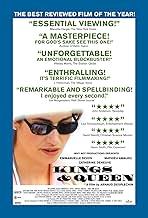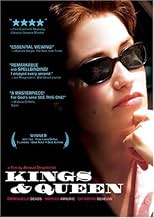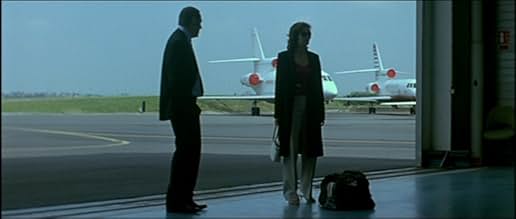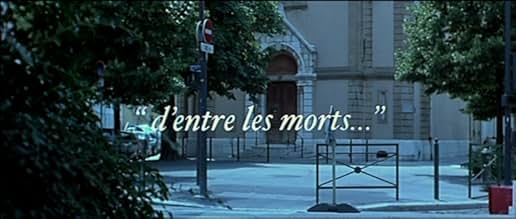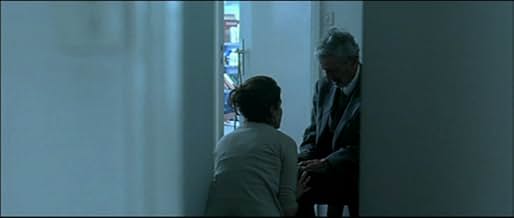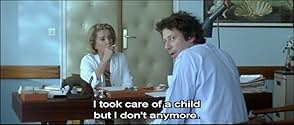Füge eine Handlung in deiner Sprache hinzuParallel storylines tell the current state of affairs for two ex-lovers: Nora's a single mother who comes to care for her terminally ill father; holed in up in mental ward, Ismael, a brillia... Alles lesenParallel storylines tell the current state of affairs for two ex-lovers: Nora's a single mother who comes to care for her terminally ill father; holed in up in mental ward, Ismael, a brilliant musician, plots his escape.Parallel storylines tell the current state of affairs for two ex-lovers: Nora's a single mother who comes to care for her terminally ill father; holed in up in mental ward, Ismael, a brilliant musician, plots his escape.
- Regie
- Drehbuch
- Hauptbesetzung
- Auszeichnungen
- 9 Gewinne & 18 Nominierungen insgesamt
Empfohlene Bewertungen
Use of two parallel, initially apparently unrelated story lines is a favourite structure for movie makers. One that immediately comes to mind is Le Huitieme Jour. In Rois et Reine, one thread is Nora, a beautiful art gallery director struggling with a terminally ill father and a fatherless son Elias. The other thread is Ismael, a viola player taken into a psychiatric ward through strange circumstances. However, it does not take long (relative to the two-and-a-half-hour film) to get to the convergence point where the audience are privy to the fact that Nora and Ismael had lived together for seven years during which Nora's son developed a devoting affection for and attachment to Ismael (which, incidentally, reminds me of a similar relationship in Love Actually, in a character played by Liam Neeson).
But this is only the bare beginning. The sprawling story surrounding these two main characters commands the viewers' every attention, and this film really deserves several viewing.
I wouldn't attempt to go into all the details of the many characters, sub-plots and sub-texts. Briefly, the central story is Nora's relationships with three men, Elias's father who was shot under suspicious circumstances, Ismael who became Elias's de facto father and the man she is now going to marry but is not really certain if she truly loves or not. While those relationships are touched on lightly, some through flashbacks, her relationship with her father Louis and sister Chloe receive sharper focus, with twists and turns leading to some rather devastating revelations towards the end.
With Ismael's family (and there are quite a few members) the circumstances are very different, but equally intriguing. While there is also conflict, and this one centres around the issue of adoption and estate, the mood in one of wry humour. Family matters aside, there is also another dimension, the psychiatric ward, where Ismael interacts with no less than three psychiatrists (one played by Catherine Deneuve) as well as a women fellow-patient Arielle with whom he develops a close relationship that continues after their discharge.
And don't be mislead into thinking that quantity will compromise quality. The entire film is throbbing with energy, telling the story in so many different ways, in so many changing moods, which, however, never feels disjointed. Similarly, the deft use of background music brings you delight in every turn.
I have only touched on the bare surface of this absorbing film. Among the many fascinating aspects of the film is the development of the two main characters and a common characteristic: both are vain and arrogant. Yet, the interesting thing is that they are not portrayed in that light at all. It's through the description by other characters that this comes to light, and then we are compelled to look behind the surface to understand.
The audience will find that there are many scenes, from devastatingly emotional to hilariously noire, that they will remember long afterwards. If I were to pick a most memorable one, however, it will be the last scene, between Ismael and Elias, and I think many who have seen the film will agree. A masterful piece of auteurist work, Rois et Reine is a film that will be a crime to miss.
There's a lot of play with psychoanalysis (highlighted by Catherine Denueve in a bit part as a psychiatrist) that is fun and illuminating to watch. There's speckles of romance, dark humor, nihilism, magic realism, and soap opera theatrics with lots of references to philosophy, mythology, and poetry that keep the film interesting and unpredictable even as its over two and a half hour run time tries your patience. There are plenty of revelations and big emotional payoffs here punctuated well with eclectic music choices (everything from classical pieces to some sort of catchy European hip-hop) and nice little surprises (Magalie Woch is delightful as the lovely suicidal mental patient who becomes smitten with Ismael). This utterly French film gives the viewer a lot to chew on, even if you have to gnaw through a bit of gristle before dining on the filet mignon.
Secondary characters in this overwritten but always entertaining drama make themselves hard to forget though buffoonery in the case of the Ismaël's junkie lawyer (Hypolytte Girardot); though their neediness, in the case of Arielle, "la Chinoise" a flirtatious 'princess' at the psych hospital, (Magalie Woch) or Nora's sister down-and-out Chloé, (Nathalie Boutefeu); bitchiness in the case of Ismaë's sister. Ismaël's usual shrink is a huge African grande dame; he gets his entrance exam and his walking papers at the hospital from none other than Catherine Deneuve (whose iciness and soulfulness would be an unforgettable blend even if she were not already one of the world's most beautiful sixty-somethings). The women are goddesses, bitches, or queens. Ismaël says women have no souls; but the story's main men are talented but narcissistic problem children. Elias seems poised to grow up into one of those too. Most of the acting is remarkable, or at the very least arresting. The mercurial Amalric and lovely Devos completely live up to their top billing. Still, even their parts might have done with some trimming back.
The movie comes with allusions to Leda and the Swan, Nietsche, Yeats, Emily Dickenson, and a large number of musical references including rap (and a break dancing demo by Ismaël at the mental hospital), Klezmer, Randy Newman and, as a framing device, Moon River. Suspicions that there may be too much going on here are stifled by sheer pleasure in the drama of it all.
Six César nominations in France, where it opened in late 2004.
The title may refer to Shakespeare's plays, or to the way paterfamilias are seen by their children. "Kings and Queen" is wildly unedited and at 2 ½ hours definitely too long; Desplechin even acknowledged repeatedly that his answers to questions after the SFFF showing were too long too. But his inability to edit his work down may be hard to separate from his unique flavor and charm. Desplechin wrote the excellent screenplay for "Un monde sans pitié" ("A World Without Pity," 1989) the story of a fascinating young loser. "Desplechin is a wonder with actresses, at least as long as they're with him: Devos' character is close enough to 'My Sex Life' star and former Desplechin paramour Mariane Denicourt that she responded to the movie with a retaliatory roman à clef," writes Sam Adams in the Philadelphia City Paper. A question about this contretemps met with a flurry of interesting doubletalk from the soft-spoken director.
Desplechin's 1996 "My Sex Life" was brilliant - a rambling, shambling, thoroughly engaging 3 hour trip through the lives of a group of rambling, shambling, lost characters, made by a director looking to pour as much raw life into a film as possible and let the rest sort itself out. He has no interest in a well-knit story....
This somehow doesn't work as well here...what is missing is the "engaging" part. This isn't a matter of his being unable edit himself; it's just characters and their situations just seem less able to cross the divide and touch you.
But i'm all in favor of Desplechin's intentions. This is a director definitely worthy of trust and respect. And can all those critics be wrong? I'm going to see this again.
"My Sex Life" had the benefit of three wonderful actors: Mathieu Almaric, Jeanne Ballibar and Emmanuelle Devos...we need more films from all three. Almaric and Devos return here. He is, as always, terrifically fun to watch. But this is her movie...Emmanuelle Devos seems to be coming into her own now, after years of playing lesser roles (The Beat my Heart Skipped). She is a marvel. Always playing the victim, stoic and long-suffering, and always bringing to this role a huge richness of feeling. She is heart-wrenching here, as she was in "My Sex Life", which she practically stole. And what a remarkable look she has...one moment the ugly duckling, another moment a ravishing beauty. I can't take my eyes off her. A great actress.
Wusstest du schon
- WissenswertesThe title of the movie was inspired to Arnaud Desplechin by the five first lines of a poem by Michel Leiris: "Rois sans arrois Reine sans arène Tour trouée Fou à lier Cavalier seul"
- Zitate
Nora Cotterelle: There are four men I loved. I killed two of them.
- VerbindungenReferenced in Liebe ist Nervensache (2005)
- SoundtracksPavane pour une Infante défunte
Composed by Maurice Ravel
Top-Auswahl
- How long is Kings & Queen?Powered by Alexa
Details
- Erscheinungsdatum
- Herkunftsland
- Offizielle Standorte
- Sprachen
- Auch bekannt als
- Kings & Queen
- Drehorte
- Produktionsfirmen
- Weitere beteiligte Unternehmen bei IMDbPro anzeigen
Box Office
- Budget
- 3.871.153 € (geschätzt)
- Bruttoertrag in den USA und Kanada
- 290.973 $
- Eröffnungswochenende in den USA und in Kanada
- 16.101 $
- 15. Mai 2005
- Weltweiter Bruttoertrag
- 3.839.556 $
- Laufzeit2 Stunden 30 Minuten
- Farbe
- Sound-Mix
- Seitenverhältnis
- 2.35 : 1
Zu dieser Seite beitragen


